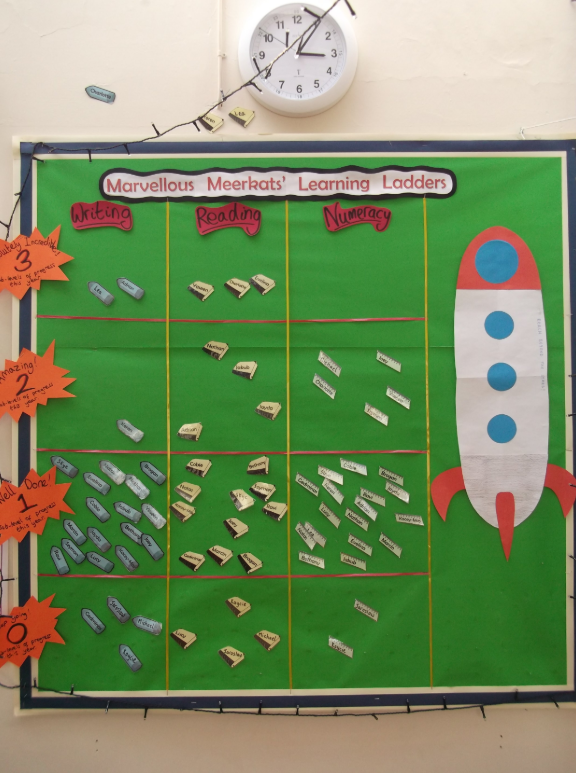Growth mindset: lessons from primary school
Andrew Chaplin, delivery
Hi, we haven’t been introduced
I’m Andrew. The gold nameplate on my desk says Delivery Manager (I’m only joking - we don’t really have nameplates). This means it’s my role to ensure everyone has the tools, tasks and time they need to deliver value towards our goal.
But I’m an archivist at heart; I love casting my gaze backwards to recount nostalgic stories and spot patterns. Here’s one:
Before joining Local Welcome, I was a primary school teacher (shout out to teachers!) in Kettering (shout out to Kettering!) – so it was my job to develop a learning culture. Ever heard of Carol Dweck? She’s great at this sort of thing, and developed the ‘Growth Mindset’ model (this handy infographic gives you the basics, but you really should read the book).
The pattern? Growth mindset had an impact in my classroom. And growth mindset is also having an impact on our team. Here’s how…
Mistakes are marvellous
A child who is afraid to make mistakes is a child who is not ready to learn. Kids hate getting things wrong. But that’s only if they see a mistake as an eternal judgement on their abilities. If they see it as an opportunity to learn, then the mistake doesn’t have the final word.
Days, weeks or months after the mistake, I’d pin it up on the board, circled, next to that day’s work, when they got it right. And then it would be time to party – break out the maltesers, stick on ‘Everything is Awesome’, get the fairy lights flashing, and dance around the room.
At Local Welcome, we do the same (minus the maltesers. Some of us are vegan. And prefer beer). Working with an agile design approach, taking one step at a time, focusing on outcomes and not outputs, all means that mistakes are crucial. Mistakes prompt the iterations – we listen to user needs, come up with some hypotheses, design a prototype, then test it. It never works first time. But the mistakes help us improve our product, so we look on them positively.
And when a mistake is not the end of the road, anything is possible.
My colleague, Mr Evans, wouldn’t let a kid get away with asserting they couldn’t do something.
”I can’t draw faces!”
“I can’t take penalties”
“I can’t do column addition”
Mr Evans demanded that they added one extra word to their forlorn, angry protestations. Yet.
“You can’t draw faces yet. Just ‘cos you can’t today, doesn’t mean that, if you learn from your mistakes, you won’t one day be able to.”
Occasionally I hear adults declaring similar sentiments, as though whatever it is they can’t do is unlearnable. It makes me so sad.
So yeah, there are a lot of things we at Local Welcome can’t do yet. I’m struggling to blog as well as Claire right now, for starters. None of us in the office can take notes and chair meetings simultaneously like Will can. And Local Welcome itself still hasn’t run a meal without a staff member present. Yet.
Learning feels hard
The reason we avoid mistakes is that it never feels nice to fail. It’s been hard getting things wrong as a team. We spent a day in Liverpool and didn’t secure a venue. We’ve had events with too many people so the food runs out, or with too few so we’re rattling around. We’ve watched on in horror as a test user recoiled at our first sign-up flow; “they want my time and they want me to pay – this is crazy!”
Becoming comfortable (or tolerant, at least) with that emotional heart-pummelling is vital if the issues are to be confronted and lessons learned. This is where resilience comes in. Our brains are stretchy, we can train them to get better at this. Psychologist and writer, JoAnn Deak, and artist, Sarah Ackerley, illustrated this concept beautifully in ‘Your Fantastic Elastic Brain’. As a class teacher, I illustrated this concept less beautifully, in ‘the learning valley’.
Learning feels hard, but it’s what keeps us human. It’s a place of tough conversations, self-reflection, and putting in the hours. My only alternative is a close-minded robotic opt-out, that I know will leave me ill-equipped to tackle the challenges that inevitably await me (whether as a husband, as a citizen in a climate emergency, or as an Aston Villa supporter).
Philosopher Eric Hoffer summed this up well;
“Learners will inherit the earth, while knowers will find themselves beautifully equipped to deal with a world that no longer exists.”
Progress is a motivator, achievement isn’t
Local Welcome is still a minnow, relatively speaking. We only got an office 9 months ago, and it feels like we’re launching in new cities at a painfully slow rate. And it’s taken almost four years just to get this far! *Sigh*
When we compare ourselves to how other (much bigger and more established) players in the sector are doing, it’s easy to get despondent. We’re no unicorn. We don’t have a widely-recognised brand. We aren’t even coding yet.
But when we think about how far we’ve come, (both since 2015, and even since January), our smiles reappear. Because progress is a motivator – evidence that there’s an upwards trajectory, and that mistakes are constantly being made marvellous through our learning from them.
Low-ranking Thailand conceded 20 goals in their three games during this summer’s World Cup group stage. They’re a minnow like us. But come their third game, Kanjana Sung-Ngoen finally scored the team’s one and only goal, and it brought their manager to tears. Thailand proved they were on an upward trajectory. (Argentina’s emotion at managing a 0-0 draw with Japan demonstrates the same point).
That it’s more motivating to be told ‘now try the next level up’, rather than ‘now get to the top level ASAP’, is pretty obvious. But society often still communicates the latter. I’ve seen countless classroom displays where the children are ranked according to how well they’re doing, and told that they all need to reach the top. But that gives some a much bigger distance to climb than others.
When pupils joined my class, I ranked them by progress. The fluent readers started on the bottom, alongside non-English speakers and those who’d been under-supported without any books at home. Then the challenge was on – to compete according to the progress they each could make, rather than a lopsided Premier League of predetermined outcomes.
Putting in the hours
It’s not about fluke. It’s not about fate. It’s not about natural ability.
If we ever achieve our goal, it will be because of the effort we put in. Hard graft is what counts… that overused saying about what practice makes has some truth to it. As Claire put it in her last blog: “You’re not going to go full Mariah Carey if you don’t put in the hours.”
As proved by Lucy Bronze, whose screamer against Norway from the top of the box was enough to impress Saint David Beckham himself (you’ll forgive me my third World Cup reference – I’m hooked). “I was practising that one this morning” she said. Credit to the hours of effort she puts in every day, that’s made her PFA footballer of the year. Twice.
So do we believe in putting in the hours? You tell me.
We’ve run more than 250 meals, and we’re still improving the ritual. A back-of-an-envelope calculation tells me that, if you factor in the organising and debrief of each meal, we’ve already spent 6000 hours on just getting the design of a Local Welcome event right.
That’s 133 working weeks. I’ve had fine single malts that have been aged for less.
All this comes back to our values: think big and act long-term, grow and learn, be humble.
A Growth Mindset organisation needs to believe that mistakes are opportune and that iterations take time. It needs to motivate with measures of progress, and nurture a resilient culture where the ‘learning valley’ can be overcome. It needs to adopt the mindset of the minnow; we are the Thailand women’s football team at the World Cup, we are the non-English speaking Year 3 pupil learning to read.



